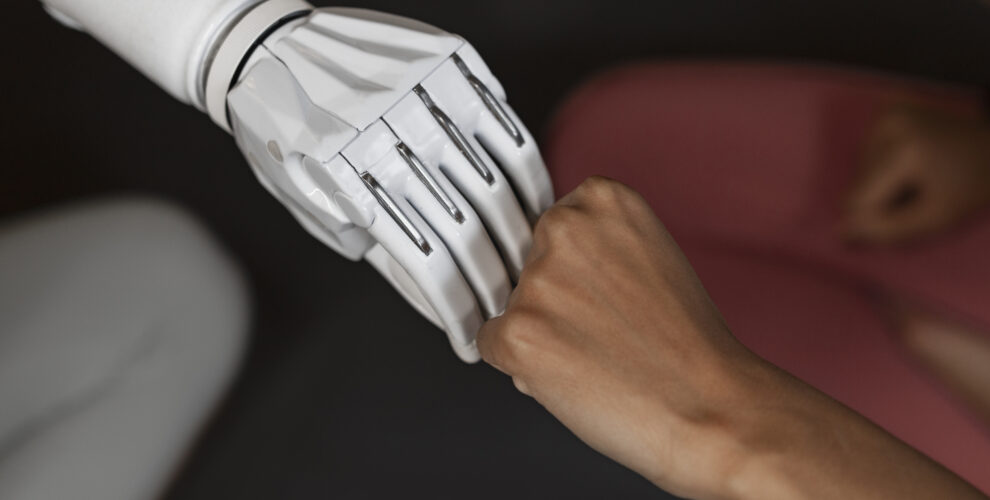Do you ever wonder if this rapidly growing AI will replace humans? Tom Cruise’s Cruise Oblivion: Age of Tomorrow is a movie where you can find machines acting and thinking like humans. AI applications work faster, with greater operation efficiency and accuracy, and with better decision-making than humans. This says that artificial intelligence achievements closely mimic human intelligence in the sense of understanding, reasoning, and learning. However, there is cause and effect with these innovations, and the significant advancements outperform humans in specific tasks, which challenges the scope of human intelligence. It symbolises that the future of developing artificial intelligence requires experts, and it creates various career opportunities. So, if you’re a computer science student or pursuing B-tech artificial intelligence and data science colleges in Tamil Nadu, then this article would give you insights about AI.
Will AI replace humans?
No, AI will not replace human intelligence, as it is humans who are developing AI applications through programming and algorithms. Automation makes it easier to replace manual labour, and today, in every sector, these AI technologies are making it easier to complete complex tasks. You can also develop automation applications with your degree from the artificial intelligence colleges in Tamil Nadu. Let’s discuss the six reasons that AI can’t replace human intelligence.
1. Emotional intelligence
One distinctive quality that makes people relevant is emotional intelligence. While artificial intelligence (AI) aims to mirror human intelligence, emotional intelligence is more difficult to duplicate than intellectual intelligence. Why? Since AI is incapable of feeling pain, it requires empathy and an in-depth awareness of the human condition, including pain and suffering. Smart corporate executives and business owners are aware of the value of appealing to the emotions of their personnel and customers. These kinds of human interactions cannot be achieved by a machine.
2. Works based on the algorithm:
AI can only operate using the given data. Anything beyond that would be asking too much of it, and machines aren’t created that way. Therefore, the machine is useless if the data entered into it fails to include a new field of labour or if its algorithm does not account for unexpected events. Artificial intelligence (AI) cannot easily mimic human reasoning or the capacity of the human brain to analyse, create, improvise, and gather information.
3. Limited creative process:
Since AI, as has been proven, can only operate with the information that it gets, it lacks the human ability to generate original ideas and methods of accomplishing work. As a result, it is limited to the defined frameworks and unable to develop new strategies, techniques, or behavioural patterns. Humans are capable of creative problem-solving, utilising a variety of information sources to produce solutions to complicated issues with little to no data. Since AI lacks the capacity for creative thought and the ability to come up with innovative ideas, it cannot replace humans in the workplace.
4. Humans make AI:
Artificial intelligence is intelligence created by humans. Humans provide the data and create algorithms that AI machines or applications use to operate. And individuals are the ones who use these gadgets. As AI applications grow, so will the demand for human services. Someone who also creates the AI systems for these machines is required to construct, manage, and maintain them. These machines need to be built, run, and maintained by someone who also designs the AI systems for them.
5. Require a Fact Check:
The fact that artificially intelligent chatbots like ChatGPT or other AI content-generating applications often commit mistakes and need human editors to double-check their facts is a major issue. While AI can learn incredibly quickly, it lacks logic and is, therefore, unable to deduce and challenge the truth to the same extent that humans can. This is why you should probably stay away from asking certain questions of AI robots.
6. Soft skills are not for AI:
Soft skills are essential for humans, to name just a few; they include collaboration, focus on specifics, analytical and imaginative thinking, successful interaction, and interpersonal skills. Every industry needs these soft skills, so you must acquire them if you want to thrive in your career. These are talents that humans learn and are expected to have, whereas they are impossible to implement in AI frameworks.
Conclusion:
The development of AI is currently being monitored by humans, who also implement all required security measures. The future of artificial intelligence seems to involve efficient and accurate human and computer workforce processing for the benefit of humanity. However, the future is in human-AI collaboration, where the strengths of both may be used to each other’s advantage. It is possible when the field has AI experts who can write codes and assist the machines, so if you like to control machines and make your work simpler, then it is better to enroll in the best colleges for artificial intelligence in Coimbatore. You can also learn and develop the ethical frameworks for AI applications and receive benefits.


